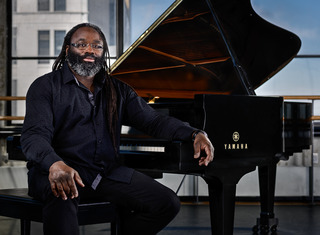by Jarrett Hoffman

Winner of the Naumburg International Piano Competition in 1992 and an Avery Fisher Career Grant two years later, Awadagin Pratt has given recitals at Lincoln Center, performed with the New York Philharmonic, and has taught piano at the College-Conservatory of Music at the University of Cincinnati since 2004.
He’s also familiar with both Pennsylvania Avenue and Sesame Street: he played at the White House three times across the Clinton and Obama years and appeared on that PBS favorite in 1998 to share a piano with an eight-foot, two-inch yellow canary.
“The three B’s — Bill, Barack, and Big Bird,” Pratt said in a recent conversation. “Sesame Street was a lot earlier in my career. It was funny, there were friends of mine who said, ‘I saw you on Sesame Street.’ I’m like, ‘What do you mean you saw me on Sesame Street? You don’t have kids.’ For some people, if I tell them I played in Carnegie Hall, that’s like, OK whatever, but Sesame Street, that’s quite something.”
The White House is where Pratt has felt most honored to play. “At each occasion, I just felt like, what higher honor could you have than to play for the leader of your country? I think I always understood what it meant, and it continues to mean that much and more the further I get away from it.”
Regarding Sunday’s program, Pratt said Beethoven’s Sonata in D, Op. 10, No. 3 is linked to Brahms’s Ballades, Op. 10 through Beethoven’s second movement. “It’s a profound movement. These were two young people — Brahms moreso, but also probably more scarred at that point than Beethoven, showing emotional depth and understanding of certain aspects of humanity. Both pieces are very powerful statements for those early opus numbers.”
The pianist said the Beethoven Sonata is not what you expect from the composer. “Outside of that slow movement, it’s a kind of light piece. There’s humor in it, there’s almost some frivolity — things you don’t immediately associate with Beethoven — so it’s unusual in that way. But the rest of the program is reflective and powerful. It’s emotionally draining to play, but there’s a lot of real meaning in it.”
Pratt will open the second half with two of Bach’s Chorale Preludes transcribed by Busoni, following with Auerbach’s Chorale, Fugue and Postlude and Franck’s Prelude, Chorale and Fugue. “Certainly Bach was the inspiration for Franck. And for Auerbach the form is in reference to Franck, and by implication to Bach.”
A multi-talented musician, Pratt was the first student in the history of the Peabody Conservatory to earn diplomas in three different areas: piano, violin, and conducting. “Just today I was coaching the Brahms G-Major Violin Sonata I played on my senior recital as a violinist and which I’ve coached with five or six people on both instruments,” he said. “I think seeing a piece from every possible angle is what has informed my music-making more than anything else. Certain markings or other aspects that keep cropping up across a composer’s output — those are things I’m attuned to.”
I asked Pratt about two of his outside interests: chess and tennis. “When I’m aggressively practicing and thinking about problem solving at the interpretive or performing level, then I do better at chess problems on the computer. But they’re not really related, and it’s good that I have outlets like that.” His favorite opening? “Kingside, E-4.”
As a tennis fan, Pratt said, “I’m a Federer guy. I also like Tsonga, and the Zverev brothers — they have radically different games, but I think they both bring good energy. I’m not a Nadal fan at all. On the women’s side, the Williams sisters for sure, and historically, Martina Navratilova, Pete Sampras, John McEnroe…”
What’s the story behind the twisted racket hanging on the wall of his teaching studio you can see in a YouTube video? “That’s the only racket I’ve broken in my life — maybe ten years ago now. Obviously I was frustrated at how someone was calling the lines, but I was also frustrated and angry with myself for being frustrated.” He laughed. “So that happened. And it’s a reminder of something — I don’t know what exactly, but it’s funny to have it in the studio.”
Published on ClevelandClassical.com November 14, 2017.
Click here for a printable copy of this article



